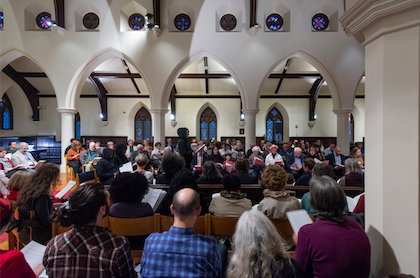The Mission of the Hannah Arendt Center at Bard College is to create and nurture an institutional space for bold, risky and provocative thinking about our political world in the spirit of Hannah Arendt. Our vision is to empower a plural people to at once (re)discover their unique opinions and political agency and also find common ground to build together a shared world through thinking, listening, and talking with one another.
What We Do
To fullfill our mission, the Hannah Arendt Center oversees a variety of programs—the Courage to Be, and the Virtual Reading Group, Podcasts, among others—that combine courses, symposia, blogs, and oral histories to bring Arendt’s fearless style of thinking to a broad audience. The Center hosts lectures, visiting scholars, post-doctoral fellows, philosophers, thinkers, artists and activists that come together at Bard College's Annandale campus to discuss contemporary issues. We foster bold and provocative thinking about ethics and politics that is rooted in the humanist tradition. After Hannah Arendt’s death in 1975, her personal library was acquired by Bard College. We partner with archivists at Stevenson Library at Bard who cares for and makes available the Hannah Arendt Library, which houses nearly 5,000 books from Arendt’s personal library, many with marginalia and notes. Above all, the Center provides an intellectual space for passionate, uncensored, nonpartisan thinking that reframes and deepens the fundamental questions facing our nation and our world.
Our Location
McCarthy House, located on Annandale Road toward the north end of the Bard College campus, houses the Hannah Arendt Center for Politics and Humanities and the Human Rights Project. The house was occupied by novelist and critic Mary McCarthy when she taught English at Bard from 1946 to 1947, and when she returned, from 1986 to 1989. McCarthy and Hannah Arendt were good friends for many years, and McCarthy served as Arendt's literary executor from 1976 until her death in 1989. The conference room in the house features Arendt's desk from her last apartment in New York City.
In the Spirit of Hannah Arendt
In her book Men in Dark Times, Arendt explains that darkness does not name the genocides, purges, and hunger that mark the tragedies of the twentieth century. Instead, darkness refers to the way these horrors appear in public discourse and yet remain hidden.
Concentration camps in the mid-twentieth century—and now environmental degradation, the emergence of a superfluous underclass, and dangerous economic irresponsibility—confront us daily. They are not shrouded in secrecy but are darkened by the "highly efficient talk and double-talk of nearly all official representatives, who, without interruption and in many ingenious variations, explained away unpleasant facts and justified concerns." Darkness, for Arendt, names the all-too-public invisibility of inconvenient facts.
Copyright Inquiries
The Hannah Arendt Bluecher Literary Trust is a legal entity established in the Last Will and Testament of Hannah Arendt. Georges Borchardt Inc., is the Trust's literary agent. The Trust holds all rights of copyright to Arendt's writings. All inquiries about rights to publish Arendt's written or spoken words must be addressed, in as much detail as possible, to Valerie Borchardt at [email protected]; all inquiries about photographs and their reproduction must be addressed, also in as much detail as possible, to Michael Slade at Art Resource at [email protected].




